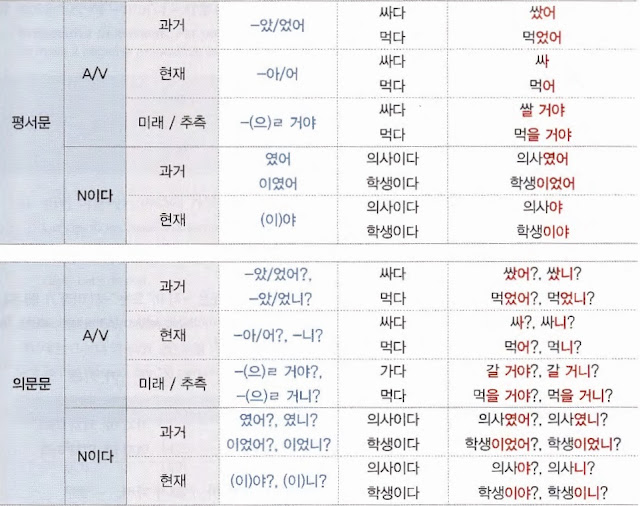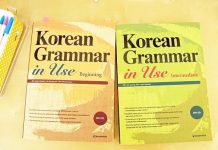가: 은혜야, 잘지냈니?
Eunhye, are you doing okay?
나: 응, 잘 지냈어. 너는?
Yeah, I’m doing fine. And you?
가: 동현아, 벌써 점심시간이야. 점심 먹으러 갈까?
Donghyeon, it’s already lunchtime. Shall we go to lunch?
나: 지금 가면 사람이 많을 거야. 조금 이따가 가자.
There will be a lot of people if we go now. Let’s go in a bit.
가: 그래. 그러자.
Okay. Let’s do that.
The informal form is used mainly when talking with close friends and classmates and among family members. Because it is less polite than the -아/어요 form, if you use it when speaking to someone with whom you are not familiar; it can come across as rude even if the person is younger than you. In most cases, the informal form is made by omitting 요 from -아/어요, but there are exceptions depending on the sentence style.
1. Declarative and Interrogative Sentences: The present and past tense forms of declarative and interrogative sentences in the informal form are made by removing 요 from the ends of -아/어요 and -았/었어요. The future tense form is made by adding (으)ㄹ 거야 to the stem.
 (1) 아니다 is written as 아니야 for the present tense and as 아니었어 for the past tense. When answering a question, 응 or 어 is used for 네, and 아니 is used for 아니요.
(1) 아니다 is written as 아니야 for the present tense and as 아니었어 for the past tense. When answering a question, 응 or 어 is used for 네, and 아니 is used for 아니요.
가: 주말에 영화 볼까?
Wanna see a movie on the weekend?
나: 응, 그래
Sure. Sounds good.
가: 아까 그 사람 누구야?
Who was that just now?
나: 내 동생이야.
My little brother/sister.
가: 내일 도서관에 갈 거니?
Are you going to the library tomorrow?
나: 아니, 안갈 거야.
No, I’m not going.
가: 카일리 씨는 미국 사람이야?
Is Kylie American?
나: 아니, 미국 사람이 아니야, 뉴질랜드 사람이야.
No, she is not American. She’s a New Zealander.
(2) While -아/어? can be used with superiors and those older than you if you are on familiar terms with them, -니? cannot be used in such cases.
(친구 사이)
• 서준: 본수야. 지금 책 읽니?/읽어?
Beomsu, are you reading a book now?
범수: 응, 책 읽어.
Yeah, I’m reading a book.
(동생과 누나 사이)
동생: 누나, 지금 뭐 해? (O) / 지금 뭐 하니? (X)
Little Brother: Sis, what are you doing now?
누나: 책 읽어.
Big Sister: Reading a book.
2. Imperative Sentences: For imperative sentences, either -아/어 or -아/어라 is added to the verb stem. To make a negative imperative sentence, either -지 마 or -지 마라 is used.
 가: 비가 오니까우산 가지고 가. /가라.
가: 비가 오니까우산 가지고 가. /가라.
It’s raining, so take an umbrella.
나 알았어, 가지고 갈게.
Okay, i’ll take one.
가: 내일은 늦지 마. /늦지 마라.
Don’t be late tomorrow.
나: 그래, 안늦을게.
Okay. I won’t be late.
Note that while -아/어 can be used when talking with those older than you or superior in social rank if they are close acquaintances, -아/어라 cannot be used in such cases. In other words, -아/어라 is used with those younger or of a more inferior social status when compared to those with whom -아/어 can be used.
(동생과 오빠 사이)
동생: 오빠, 이것 좀 가르쳐 줘. (이 / 가르쳐 줘라. (X)
Little Sister: Big Brother, teach me (how to do) this.
오빠: 그래, 가르쳐 줄게.
Big Brother: Okay. I’ll teach you.
3. Propositive Sentences: For propositive sentences, -아/어 or -자 can be added to the verb stem. To make a negative propositive sentence, -지 말자 is added to the stem.
 가: 이번 여름에는 바다에 가자.
가: 이번 여름에는 바다에 가자.
Let’s go to the beach this summer.
나: 그래, 그러자.
Okay. Let’s do that.
가: 오늘은 운동하러가지 말자.
Let’s not exercise today.
나: 그럼, 뭐할까?
In that case, what shall we do?
4. Word Variation
In informal Korean, the 1st person pronoun 저/제 changes to 나/내. The 2nd person pronoun is 너/네.
 가: 나는 된장찌개 먹을 건데 너는 뭐 먹을 거야?
가: 나는 된장찌개 먹을 건데 너는 뭐 먹을 거야?
I’m going to have doenjang jjigae to eat. What will you have?
나: 나도 된장찌 개 먹을래.
I’ll also have doenjang jjigae.
가: 이거 네 휴대전화 아니야?
Isn’t this your mobile phone?
나: 맞아, 내 휴대 전화야. 여기 있었구나.
Yep. It’s my phone. So this is where it was.
5. Calling Others by Name
The particle 아/야 is added to the names of others when calling out to them verbally. However, it sounds strange to add this particle to the non-Korean names of foreigners.
• 영주야, 오후에 만날까?
• 하현아, 같이 저녁 먹자.
• 크리스틴아, 어제 그 드라마 봤어?(X)
->크리스틴, 어제 그 드라마 봤어?(O)
아/야 is not added to the names of foreigners.
6. People’s Names
When referring to a person by name, if the person is a close acquaintance or is younger than you, then 이 should be added if the name ends in a final consonant, However, 이 is not added to the names of foreigners.
• 호영은 (X) -> 호영이는 (O) 크리스틴이는 (X) -> 크리스틴은 (O)
• 호영을 (X) -> 호영이를 (O) 크리스틴이를 (X) -> 크리스틴을 (0)
Note, however, that for Chinese names in Chinese characters that are pronounced according to the Korean readings for the characters, 이 is added when the name ends in a final consonant. For example, the Chinese name 샤오펀 (小芬) becomes 소분 when read according to the Korean readings of the two Chinese characters. Thus, while 사오펀 does not take 이,소분 does
>> You can click on the title of the grammar below to learn ‘Narrative Forms’:
서술체
>> Full of Intermediate grammar: Click here



![[Korean grammar] -(으)ㄴ/는 척하다 Expressing Habits and Attitudes](https://sayhikorean.com/wp-content/uploads/2021/10/1_94.1.jpg)
![[Korean grammar] -기는요 Expressing Habits and Attitudes](https://sayhikorean.com/wp-content/uploads/2021/10/1_93.1.jpg)
![[Korean grammar] -곤 하다 Expressing Habits and Attitudes](https://sayhikorean.com/wp-content/uploads/2021/10/1_92.1.jpg)
![[Korean grammar] -았/었어야 했는데 Expressing Regret](https://sayhikorean.com/wp-content/uploads/2021/10/1_91.1.jpg)
![[Korean grammar] -(으)ㄹ걸 그랬다 Expressing Regret](https://sayhikorean.com/wp-content/uploads/2021/10/1_90.1.jpg)
![[Korean grammar] -(으)ㄹ 뻔하다 Expressing Hypothetical Situations](https://sayhikorean.com/wp-content/uploads/2021/10/1_89.1.jpg)
![[Korean grammar] -았/었더라면 Expressing Hypothetical Situations](https://sayhikorean.com/wp-content/uploads/2021/10/1_88.1.jpg)
![[Korean grammar] -(느)ㄴ다면 Expressing Hypothetical Situations](https://sayhikorean.com/wp-content/uploads/2021/10/1_87.1.jpg)
![[Korean grammar] -아/어 봤자 Expressing Futility](https://sayhikorean.com/wp-content/uploads/2021/10/1_86.1.jpg)
![[Korean grammar] -(으)나 마나 Expressing Futility](https://sayhikorean.com/wp-content/uploads/2021/10/1_85.1.jpg)
![[Korean grammar] -고 말다 Expressing Completion](https://sayhikorean.com/wp-content/uploads/2021/10/1_83.1.jpg)